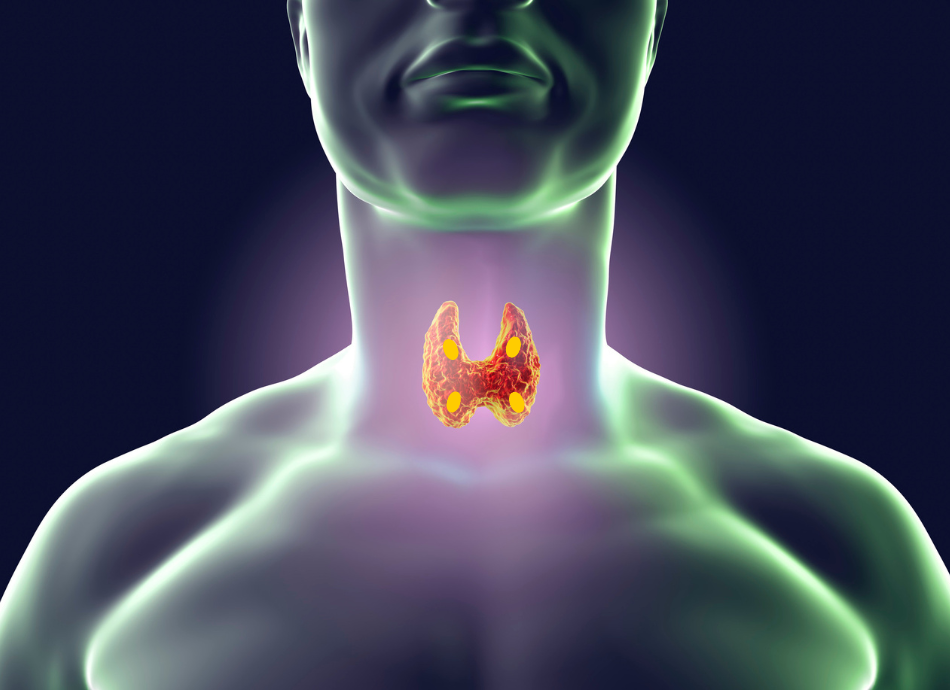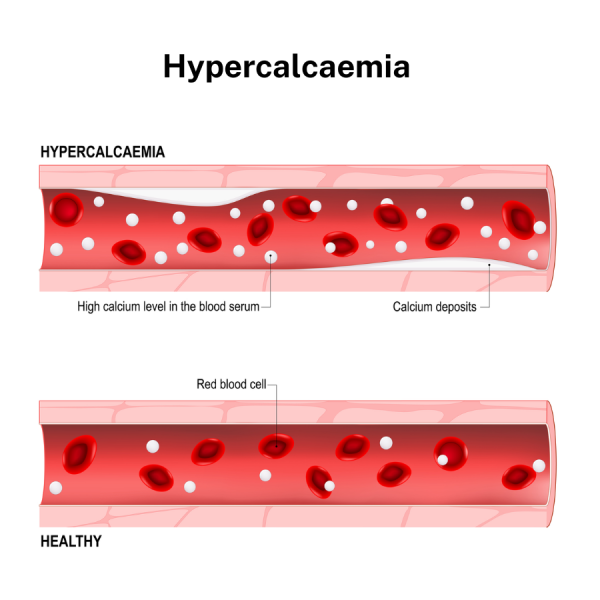Hypercalcaemia
Raised calcium levels
Key points about hypercalcaemia
- Hypercalcaemia is a condition where the calcium level in your blood is too high.
- Calcium is important for healthy bones and teeth, and for muscle and nerve activity, including your heartbeat but having too much calcium can weaken your bones and cause kidney stones. It can be life-threatening.
- The most common cause is overactive parathyroid glands.
- Symptoms are quite general so you often don't know you have this condition until it's picked up in a blood test.
- Treatment may involve monitoring (including diet and fluid intake), medication or surgery.

Hypercalcaemia is a condition caused by high blood calcium levels. Having enough calcium in your body is important for healthy bones and teeth, and for muscle and nerve activity, including your heartbeat.
But having too much calcium can weaken your muscles, bones and cause kidney stones. It can be life-threatening.

Image credit: Depositphotos
Causes
There are many causes of raised calcium levels, the most common being overactive parathyroid glands, which secrete too much parathyroid hormone. This hormone helps control the amount of calcium in your body. When too much parathyroid hormone is secreted your bones may lose calcium, you absorb more calcium from your diet and the levels of calcium in your blood and urine rise.
The parathyroid glands are 4 small glands (each about the size of a grain of rice) found in your neck, close to the thyroid gland. They produce the hormone called parathyroid hormone (also called PTH).
The image below shows where they're located. Read more about overactive parathyroid glands (also called hyperparathyroidism).

Image credit: Colorado Community College System, Anatomy & Physiology
People with cancers such as lung cancer, breast cancer and some blood cancers are at increased risk of hypercalcaemia.
Other less common causes include:
- medicines such as diuretics (water tablets) or lithium
- too much calcium or vitamin D in the diet, usually as a result of taking supplements
- severe dehydration
- kidney problems
- other diseases such as tuberculosis and sarcoidosis
- being inactive, such as spending a lot of time sitting or lying in bed.
Most people with hypercalcaemia are not usually aware they have it. It may be picked up by your healthcare provider in a routine blood test. The symptoms are quite general and non-specific.
Symptoms of hypercalcaemia
- feeling thirsty, dry mouth
- peeing (urinating) more than usual
- increasing weakness, tiredness and feeling unwell
- loss of appetite
- feeling drowsy, sleepy and having problems concentrating
- Muscle weakness, tummy pain, confusion, kidney failure, and sometimes heart rhythm problems if the hypercalcaemia is severe.
The treatment of hypercalcaemia depends on what is causing it and how severe it is. If the levels of calcium in your blood are only slightly high and you don't have any symptoms, your healthcare provider will probably just monitor your levels regularly. This will involve having blood tests every 6 months or so to check your calcium levels and kidneys. You may be advised to:
- drink more water each day to reduce the risk of kidney stones
- not exceed the recommended dietary calcium intake, eg, about 1000 mg per day
- make sure you're getting enough vitamin D.
If you have extremely high calcium levels in your blood, you may need to be hospitalised. This is so a doctor can reduce your calcium levels and monitor you regularly.
If your hypercalcaemia is due to an overactive parathyroid gland, you may require surgery to remove the parathyroid gland. Read more about treatment options for hyperparathyroidism.
For hypercalcaemia due to cancer, osteoporosis medicines called bisphosphonates are given by injection into your vein. There are other medicines that can be used but they usually require specialist care. If it's caused by high levels of vitamin D being made in your body because of certain kinds of inflammation, then a short course of steroids such as prednisone may be given.
What questions should I ask my healthcare team about hypercalcaemia?
If you're diagnosed with hypercalcaemia, you may have lots of questions for your doctor, nurse, pharmacist or other healthcare professional. It’s okay to ask questions. Here are a few suggestions.
- What is causing my hypercalcaemia?
- How severe is my hypercalcaemia?
- What are my treatment options?
- What are the side effects of treatment?
- What can I do to reduce the symptoms of hypercalcaemia?
- How will having hypercalcaemia affect my everyday life?
- Are there any foods I need to stop eating?
The following links provide further information about hypercalcaemia. Be aware that websites from other countries may have information that differs from New Zealand recommendations.
Hypercalcemia(external link) Mayo Clinic, US
Hypercalcaemia(external link) Patient Info, UK
Hypercalcaemia and hypercalciuria(external link) NZ Formulary
References
- Hypercalcaemia(external link) Mayo Clinic, US, 2024
- Hypercalcaemia(external link) Cleveland Clinic, US, 2019
Hypercalcaemia and hypercalciuria(external link) New Zealand Formulary, NZ
Hypercalcemia(external link) Cleveland Clinic, US, 2019
Hypercalcaemia(external link) Patient Info, Doctor, UK, 2022
Credits: Healthify editorial team. Healthify is brought to you by Health Navigator Charitable Trust.
Reviewed by: Dr Art Nahill, Consultant General Physician and Clinical Educator
Last reviewed:





